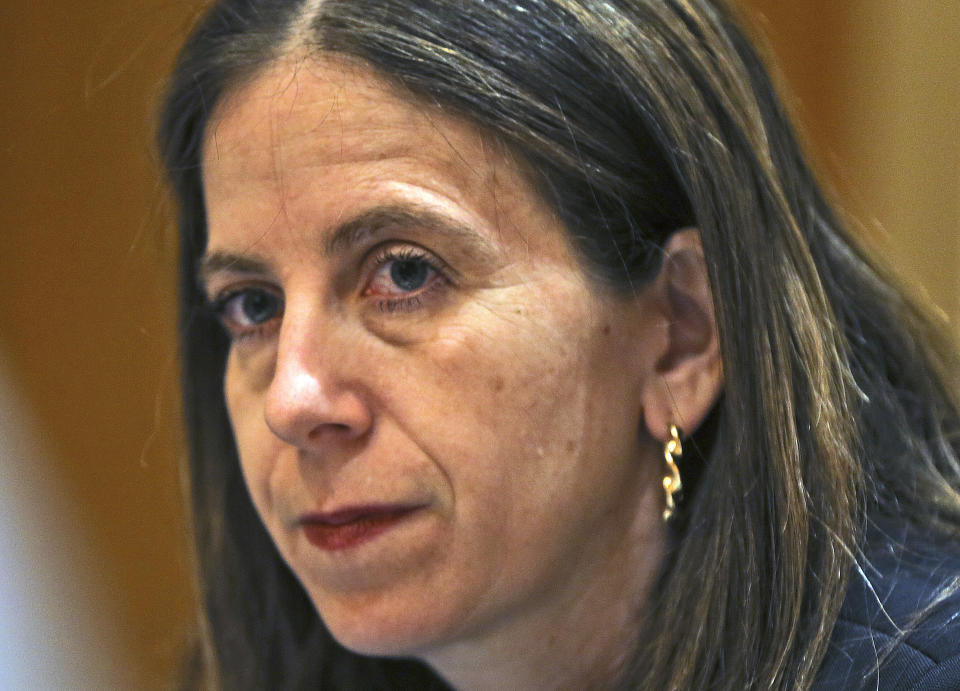U.S. warns cryptocurrency exchange operators to comply with regulations
It costs as little as $600 for a suicide bomber to kill dozens of people and cryptocurrencies make it easy to fund those attacks, according to Sigal Mandelker, the U.S. Treasury Department’s Under Secretary for Terrorism and Financial Intelligence. She spoke to thousands of people gathered in New York for the annual CoinDesk Consensus. It’s an annual conference of the biggest names in cryptocurrency and blockchain technology.
Mandelker’s message was a warning to the industry to comply with regulations designed to prevent money laundering and the financing of terrorism. “Nobody here wants to see innovative products and services misused to support terrorism and weapons proliferation,” she said.

The Treasury Department has received more than 47,000 SARs or suspicious activity reports, since 2013, citing bitcoin or other virtual currencies. Mandelker says, “Half of these SARs were filed by virtual currency exchangers or administrators themselves. It should be viewed as a duty serving our national security.”
Threats every day
Mandelker starts every day with a briefing on the latest threats to the United States. It requires vigilance. In February, Hamas, which several governments worldwide list as a terrorist organization, began accepting bitcoin donations. “Some of the features that appeal most to users and businesses, like speed of transfers, rapid settlement, global reach, and increased anonymity can also create opportunities for rogue regimes and terrorists,” according to Mandelker.
Treasury’s Financial Crimes Enforcement Network, or FinCen, says hackers stole $1.5 billion from virtual currency exchanges over the last two years. Mandelker says the industry must develop new ways to detect illegal activity. “It is to ensure that you establish a reporting system that keeps bad actors away from your businesses and protects our national security,” she said.
Industry crack down
The Treasury Department points to security markers developed by the private sector that have helped crack down on hackers and money laundering. Mandelker praises tools like device identifiers, IP addresses with associated timestamps, virtual currency wallet addresses, and transaction hashes as tools that she says help the U.S. government track down “some of the biggest non-compliant actors in this industry.” An example is the case of Alexander Vinnik.
Vinnik was arrested in Greece back in 2017 on 17 counts of money laundering and two counts of engaging in unlawful monetary transaction. The U.S. claimed Vinnik laundered more than $4 billion through the BTC-e trading platform. The U.S. Department of Justice fined BTC-e $110 million and leveled a $12 million fine against Vinnik. He insists he is innocent but is being held in Greece awaiting extradition to the U.S. to stand trial. Mandelker urged cryptocurrency exchange operators to increase efforts to comply with regulations or face a similar fate. “Treasury is laser focused on pursuing those who disregard their obligations.”
A global fight
It is Mandelker’s job to enforce sanctions against state sponsors of terrorism and individuals who break the law. She says Iran, Venezuela and Russia are launching cryptocurrencies to evade U.S. sanctions.
“Requiring anti money laundering standards around the world is vital for creating a level playing field and ensuring that bad actors don’t just gravitate to jurisdictions that have no safeguards,” Mandelker says.
In June, the Financial Action Task Force, FATF, the international organization that sets global standards to combat money laundering and the financing of terrorism, will adopt updated guidance. Mandelker says it is critical that the crypto currency industry comply with its obligations. She calls it a duty to serve the interests of national security. She told those gathered at the Consensus conference “If your business is to succeed and thrive, then your business model needs to be built on a strong foundation of anti-money laundering and sanctions compliance from the very beginning.”
Adam Shapiro is the co-host of Yahoo Finance On the Move.

